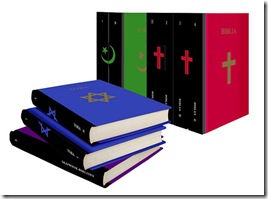Recently during an airport stopover I witnessed a fascinating scene. A group of teenage Orthodox Jewish boys were waiting to board an airplane when the oldest (or at least the tallest) young man called the group together. After a few words to his charges, he led an impromptu time of prayer and quiet Torah recitation. I was captivated by their discipline and lack of inhibition.
teenage Orthodox Jewish boys were waiting to board an airplane when the oldest (or at least the tallest) young man called the group together. After a few words to his charges, he led an impromptu time of prayer and quiet Torah recitation. I was captivated by their discipline and lack of inhibition.
Simultaneously, an event occurring twenty feet to their left made this more interesting. A middle aged Muslim man had laid out a small rug and was privately engaged in his daily prayers.
But wait, there’s more. In between these two disparate religious events was a young couple in their 20’s, holding hands while quietly engaged in their own time of prayer. I doubt that all involved were acting out of being overly concerned for their safety on the impending flight but rather doing what they normally do in their individual spiritual journey.
It was a pretty amazing scene of religious freedom, tradition, culture, and tolerance; one that you wouldn’t see just anywhere in the world. But this isn’t a piece about exercising American rights and liberties. This is about the different ways in which we worship, the man-made dialects of religion.
Repetitious prostrations on a rug, swaying back and forth while reciting Hebrew text, waving hands, dispersing incense, or five stanzas of The Old Rugged Cross are all man-made expressions of a spiritual life. Theologically, and certainly doctrinally many of these belief systems are light years apart and the end games are radically different. But all these behaviors are part and parcel of mans attempt at connecting with someone or something that is far greater than oneself and demands different comportment.
Even as atheists and agnostics advance their theories of why they don’t believe anything spiritual and use the randomness of these man-made variations as a piece of their defense, many admit to an enlightened search for how they got here and for what reason. Truth be told, I love having those conversations.
If you separate out the three mainstream western religions, Christianity, Islam, and Judaism an interesting thing comes to light. All three began in basically the same place; a fairly uncomplicated monotheistic belief system with a specific set of tenets that direct behaviors and priorities. Islam quickly split into Shite and Shi’a and further evolved in more sects that altered Allah’s basic framework passed through Mohamed. Judaism has churned out more than 11 different man-made iterations of how the original words passed to Moses are interpreted and practiced. The undeniable winner of improvisation comes from my world; Christianity. At last count there are more than 34,000 denominations specifying differences in God’s fairly simple doctrine; ‘Love Him, Love Man’. What made man think he could improve on the original?
Unfortunately, we have done what humans do best. We have turned the simple into the complicated and in doing so have put human fingerprints on the Divine tapestry. By altering and interpreting we convolute the freedom that comes from following the simple rules into the boxes and bondage that are created when we pile structure, additional rules, and rituals where once there were none. Within my Christianity, I tend to believe that Jesus made it pretty basic for his 12 disciples when He sat them down and told them what God was all about. After all, there’s little evidence these men were Mensa scholars; they were simple people like you and me. They got the simple message loud and clear and didn’t try to improve on it. The same can’t be said for subsequent generations.
Having grown up in a fundamentalist background I sprinted away from its structure and rules during my rebellious college years though I never truly left God behind. I just didn’t think about Him as much. After years of failure and success, personal gain and loss, I think about Him a lot these days. He’s much bigger than dress codes, pews and steeples, youth groups, and choir practice.
I worship these days at a church that, at times is equally as foreign to me as the diverse scene I witnessed at the airport. In church circles it would be categorized as mildly charismatic. There’s hand raising and some dancing as the pierced and tattooed congregation emotes an outpouring of their own reverence and energy. It’s not my thing though. I reverently connect quite well with my hands folded and my head bowed. It is my own language of religion. I like these people. Most have seen tough times and are genuine in celebrating their spiritual connection. Hopefully, as they observe my understated behavior they understand that while we don’t necessarily speak in the same dialect we’re communicating with someone who is fluent in all forms of speech.
Filed under: Culture | Tagged: Christianity, freedoms, Islam, Judaism, religion, religious expression |


Leave a comment